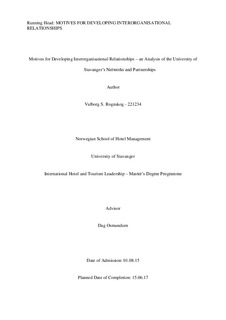Motives for Developing Interorganisational Relationships – an Analysis of the University of Stavanger’s Networks and Partnerships
Master thesis
Permanent lenke
http://hdl.handle.net/11250/2459808Utgivelsesdato
2017-06-15Metadata
Vis full innførselSamlinger
- Studentoppgaver (SV-NHS) [618]
Sammendrag
This study explores the motives for an organisation to establish partnerships with others and create networks. The University of Stavanger is the main focus and has been analysed by using previous research and new data collected through interviews and qualitative documents. The study is an exploratory study. The aim of this thesis is to get a deeper understanding of why organisations need each other to reach higher goals, and what motivates them to enter such relationships. These relationships are referred to as IORs (interorganisational relationships). Relevant literature has been gathered and key persons at the University have been interviewed to investigate the research problem. A conceptual framework that includes motives carried out by Oliver (1990) has been developed. The motives are necessity, asymmetry, efficiency, reciprocity, stability and legitimacy. The findings of this study suggest that the motives necessity, reciprocity, stability and legitimacy are more important for the University of Stavanger than asymmetry and efficiency when deciding to cooperate with other organisations.
Key words: organisational networks, cooperation, interorganisational relationships
Beskrivelse
Master's thesis in International hotel and tourism management
